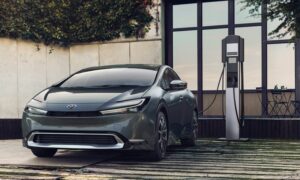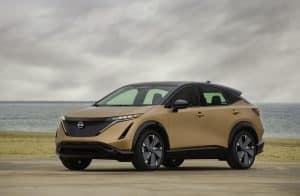Best Hybrid vs. Electric Car: Which One is Right for You?
Hybrid vs electric cars has been a debate that has grown as the electric car market has developed into a full-on segment. Buyers are now faced with a decision between hybrid and electric vehicles. Today we’ll go over the ins and outs of hybrid and electric cars in order to determine the benefits and drawbacks of owning each. From there you can choose which better suits your lifestyle.

What is a Hybrid Car?
A hybrid car combines a conventional internal combustion engine and an electric motor to drive the vehicle. The idea is the gasoline-powered engine and regenerative braking helps deliver power to the electric motor in the vehicle. The power generated from those sources then contributes to the electric motors. When driving, the car then can choose which portion of the car’s powertrain, gas or electric, is best suited for the driving conditions. Many vehicles are offered with a hybrid powertrain. Most of Toyota’s models are offered in a Hybrid and cars like the Kia Niro can be purchased as an EV, a Hybrid, or a gas-powered vehicle.
What is a Plug-in Hybrid?
Plug-in Hybrid Electric Vehicles (PHEV) are similar to Hybrid in that it uses electric motors and an internal combustion engine. Unlike a hybrid car, you have the ability to plug in and recharge the battery, much like a fully electric vehicle. These vehicles provide extraordinarily high combined gasoline and electric MPG. The Toyota RAV4 Prime, for example, can have a combined miles per gallon and electric equivalent of 94mpge. As a result, many of your shorter driving trips will be entirely emission-free. Even if you were to run out of electric charge, the gasoline engine seamlessly takes over, providing you the luxury of a longer range without the need for frequent recharging.

What is an Electric Car?
An electric car, also referred to as an electric vehicle (EV) or battery electric vehicle (BEV), is powered entirely by an electric motor. The traditional internal combustion engine you’d find in a conventional car is replaced by an electric motor that uses a battery for power. The batter is typically spread out across the floor of an electric vehicle. The battery then gives power to the electric motor(s) in the vehicle. Some EVs will have a single electric motor, but others can have 2, 3, or four depending on the vehicle. Regardless of the number of motors, these vehicles are charged via a charge port. These vehicles do not use gasoline, only electric power.
EVs can be charged using a standard electric outlet (Level 1 Charging), a 240V outlet/charging port (Level 2), or through DC Fast Charging. Level 1 has the slowest charge rate. Level 2 is faster than Level 1, but not as fast as DC Fast Charging. DC Fast Charging is going the quickest to charge an EV, however, it cannot be used at home nor should it be used on a regular basis.
Comparison: Hybrid vs. Electric Car
1. Gasoline vs Electric
Hybrid cars use both gasoline and electricity, favoring flexibility. They automatically switch between both, making it less likely to run out of power due to the wide availability of gas stations. Whereas electric vehicles run solely on electricity which comes from various sources. Constantly recharging the battery adds to your electricity bill but usually costs less per mile than gasoline.
In my opinion, if you often take long trips or reside in an area with fewer EV charging stations, a hybrid car might suit you best. If your aim is to minimize your carbon footprint and you aren’t concerned about the car’s range, consider an electric vehicle.

2. Emissions
Emissions, in terms of cars, involve the release of CO2 produced by the combustion of fuel. In hybrid vehicles, emissions occur both during electric operation and when the petrol or diesel engine kicks in, up to 89% more than initially reported. Fuel-type expansion extends mere electric range limitations, causing substantial CO2 emissions. Even so, there is a significant reduction in tailpipe emissions from a hybrid compared to a gasoline-powered vehicle.
On the contrary, electric cars solely powered by batteries, emit no tailpipe emissions. This result presents them as a viable eco-friendly option. Commuters with shorter journeys can utilize hybrid cars efficiently, while those committed to significantly reducing their carbon footprint might find electric cars more beneficial.
3. Mileage
Hybrid cars, with their dual fuel sources, offer improved mileage and can travel several hundred miles before needing to refuel. They are thriftier in the city, offering more miles per gallon. On the other hand, electric vehicles provide excellent mileage with no dependency on gasoline. However, EV range is limited by available charging points and battery size. For those wanting to improve their mileage to save on fuel, but are not in an environment where an electric car is possible, a hybrid is a great option.
4. Savings
In terms of savings, hybrid cars are generally cheaper upfront but will still sustain some fuel costs. Hybrids’ affordability and more than 145,000 gas stations nationwide make them budget-friendly while still having the convenience of a gas station fill-up. Electric cars, while pricier at the outset, offer lower operational expenses. Furthermore, many EVs qualify for up to $7,500 in federal tax credits. EVs do offer better savings, especially if you have an at-home charging setup, and are able to qualify for the federal tax credits. Nonetheless, fit for those frequently driving long distances, hybrid cars can be a thriftier option.
5. Acceleration
Generally speaking, EVs will be able to accelerate faster. However, this largely depends on the car and its application. EVs have the benefit of delivering instant torque thanks to the electric motor, but some EVs have around 7-second 0-60mph times. Whereas some hybrid cars can have sub-3-second 0-60. The same can be said the other way around where some EVs have 2-second 0-60 times and hybrids have slower 0-60 times. It all depends on the car itself.
However, the choice between the two relies not just on acceleration preferences, but also on individual lifestyle, environmental considerations, and budget constraints. Many of the fastest accelerating hybrids and EVs are very expensive cars with limited practicality. Both hybrid and electric vehicles have made strides in recent years, and it’s a promising sight for the future of the automobile industry.

6. Braking
Hybrids utilize regenerative braking, converting kinetic energy into electric charge for the battery. It’s efficient and smooth. Electric cars follow a similar principle, using brake energy recuperation to charge the battery. However, the braking feels different, with immediate response creating a unique one-pedal drive experience.
Personally, if you’re a city driver who travels short distances and enjoys a smooth ride, a hybrid’s regenerative braking system is a good match. But for those who want a unique braking experience while remaining emission-free, the electric car’s brake energy recuperation could be interesting and enjoyable.
7. Driving Feel
Driving hybrid and electric vehicles offer two distinct experiences. When in a hybrid vehicle, it will feel familiar to those driving a gas-powered car. The seamless transition between the gas engine and electric motor is impressive, often resulting in quieter and smoother rides. On the other hand, electric cars provide more torque and offer a near-silent driving experience. The instant torque delivery gives a distinct, sportier feel. While it will largely depend on the car, EVs will have a lower center of gravity than a hybrid will since the batteries are mounted on the floor of an EV.
8. Battery Range and Battery Warranty
Hybrid’s using only electric power will have less range than an EV. However, the combined effort of the gas engine and electric motor in hybrid vehicles will make up for the difference. EVs can have ranges rated at over 300 miles on a single charge. Of course, many manufacturers will offer a battery warranty for vehicles equipped with some aspect of an electric powertrain. Battery warranties vary widely. For hybrid cars, warranties usually cover 8 years or 100,000 miles. In contrast, electric vehicle battery warranties often stretch beyond 8 years and around 100,000 to 150,000 miles. This is due to the vehicle’s reliance on the battery. Battery replacement can be very costly, and these warranties are important for protecting you against heavy repair bills.
9. Hybrid vs Electric Car: Home Charger
Electric cars can be charged at home using three types, a 120-volt outlet, a 240-volt outlet, or a charging port. This provides 3 to 35 miles of range per hour of charging. This will primarily apply to people who live in single-family homes. Charging at apartment complexes can prove difficult if the complex does not offer EV charging stations. Conversely, hybrids, which use an internal combustion engine and an electric motor, can charge with regenerative braking or their engine. If it is a plug-in hybrid (PHEV), then you can charge the battery with a 120-volt outlet, a 240-volt outlet, or a charging station. Home charging works best for households with proper outlets, but a hybrid might suit those in apartment complexes or multi-family housing.
10. Hybrid vs Electric Car: Tax Rebates
Both hybrid and electric cars offer tax incentives, which constantly change and may only apply to new cars. For electric vehicles, federal tax incentives can reach up to $7,500. Hybrid and PHEVs do not receive tax rebates at the federal level.
Which Car is Right for You: Hybrid or Electric?
Hybrid and electric vehicles pose distinct offerings for eco-conscious motorists. A hybrid combines gas and electric power, easing range stress and potentially lowering fuel costs. On the other hand, an electric car runs purely on an electric motor, providing a more significant decrease in emissions and maintenance, yet it requires dedicated charging facilities.
If you commute to work and you have suitable charging options, an electric car can bring substantial savings and environmental benefits. For drivers often covering larger distances or lacking reliable charging access, a hybrid becomes a hassle-free option.
More on EV Universe:
- Insights & Updates: Stay updated in the world of electric vehicles with our insights section. Dive into our in-depth reviews, educational pieces, and the latest news.

